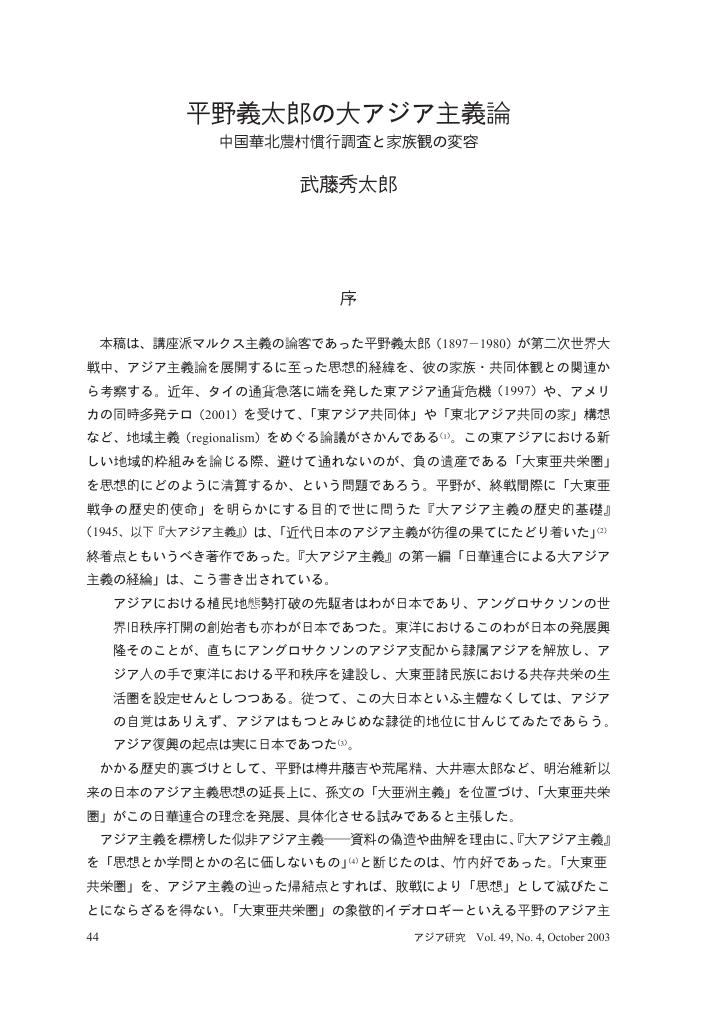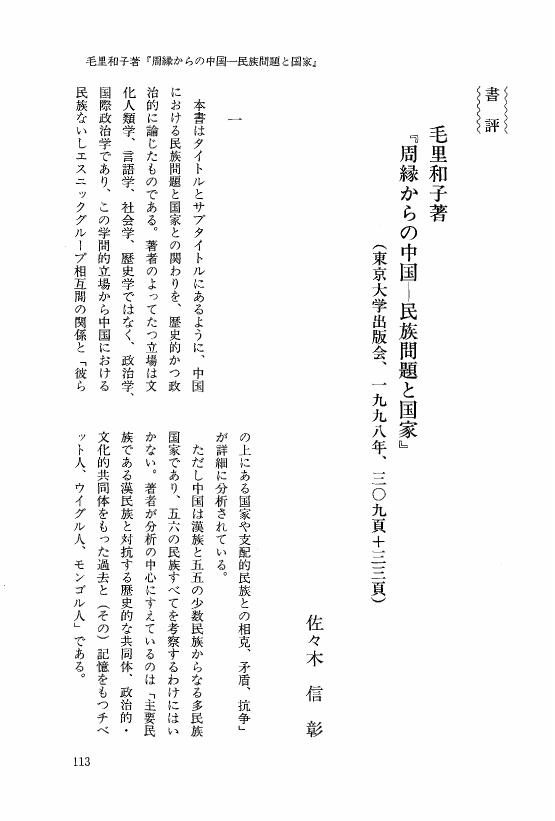- 著者
- 金 恩貞
- 出版者
- 一般財団法人 アジア政経学会
- 雑誌
- アジア研究 (ISSN:00449237)
- 巻号頁・発行日
- vol.62, no.1, pp.9-23, 2016
This paper presents an historical analysis of the policy formation process within the Japanese government regarding the issues of claims between Japan and South Korea (below, "Korea") for the period from February 1951, the start of the first round of Japan-Korea talks, to October 1953, when the talks were suspended. This paper aims at providing an overview of the Japan-Korea talks from a novel perspective via elucidation of the situation within the Japanese government during the early 1950s—a period mostly blank in previous research. The process of forming concrete policies for relations with Korea during this period in Japan was clarified as described below. <BR>The paper first presents its overview findings, while referencing previous research, of the Japanese government's negotiation strategies regarding the Japan-Korea claims issue before the Japan-Korea talks officially began, specifically in regards to how these initial strategies impacted the first round of talks. It was during this period when differences in attitudes towards the claims issue surfaced between the Ministry of Foreign Affairs and the Ministry of Finance, and considerations are presented regarding the background for such. <BR>Described next is the formation within the Ministry of Foreign Affairs of the "mutual abandonment of claims 'plus alpha'" concept around the time that the negotiations became locked and had their first suspension. This included the concept of justifying Japan's claims on Korea, with both sides then together abandoning their claims, and Japan agreeing to make monetary payments to Korea while avoiding the nomenclature of "claims." Examination is made of how the processes of discussions within the Ministry of Foreign Affairs converged on this idea, with focus on the interactions of the logic of the Asian Affairs Bureau, which viewed foreign relations with Korea as important, international circumstances at that time, and commitments Japan had to the United States. <BR>Finally, in the midst of opposition between the Ministry of Foreign Affairs and the Ministry of Finance regarding policy proposals for the Japan-Korea claims issue, clarification is made as to what kind of arguments were presented that led to the Japanese government's adoption of the Ministry of Foreign Affairs' plan as the official policy for negotiating with Korea. The flexible attitude toward Korea by the Ministry of Foreign Affairs due to its emphasis on international relations was taken up as part of the Japanese government's initial Korean strategy, and made possible a conceptual framework for government policy proposals that were more suited for mutual agreement. Also, in tandem with the changing international circumstances on the Korean peninsula, Japan could not avoid improving its relations with Korea, and this served to soften the hardline policy stance that the Ministry of Finance had adopted towards Korea. <BR>When one considers the progression of the debates within the Japanese government, most worthy of notice is that Japan did not abandon its original perceptions towards Korea, but rather conceived a solution that had as its premise exclusion of the term "claims" (literally, "the right to make claims"). It is of deep interest that this concept was similar to that inclusive within the solution of the claims issue in 1965 with the adoption of the "economic cooperation" policy in the Treaty on Basic Relations between Japan and the Republic of Korea.
1 0 0 0 雨傘運動とその後の香港政治―一党支配と分裂する多元的市民社会
- 著者
- 倉田 徹
- 出版者
- 一般財団法人 アジア政経学会
- 雑誌
- アジア研究 (ISSN:00449237)
- 巻号頁・発行日
- vol.63, no.1, pp.68-84, 2017
<p>The 2014 Umbrella Movement in Hong Kong succeeded in mobilizing large number of people by demanding democracy which meets "international standards" and by deteriorating "Hong Kong–China conflict". </p><p>However, there is a difference of nature between "international standards" and "Hong Kong–China conflict". The former represents elitist value and the supporters of the international standards prefer liberal and peaceful activities, while the latter is an issue particular to Hong Kong, and people demanding to solve the issue tends to criticize those westernized elites who are apart from the Hong Kong society. They are Hong Kong nationalists and they accept violent resistance to a certain extent. During the prolonged Umbrella Movement, nationalists criticized liberal leaders of the movement and the dispute split the movement. </p><p>After the movement, Liberal members formed "Self-determination groups" who insists that Hong Kong people should determine their own political future through referendum. And nationalists formed "Localist groups" who see Hong Kong people as a nation and expel mainlanders. </p><p>Although there exists conflict between the Self-determination groups and the Localist groups, both of them rely on political freedom which enables political activities on the street and rule of law which protects the rights of opposition. Although both political freedom and rule of law in Hong Kong are now under threat to a certain extent, internet freedom and judicial independence is guaranteed so far. When the government tries to infringe on it, both Self-determination groups and Localist groups resist strongly. </p><p>And both groups are in opposition to the Chinese central government. Both "democratic self-determination" which liberals demands and "self-determination of nations" which localists demands are not acceptable for the central government. Central government tries to isolate "a very few" pro-independence groups by co-opting democrats and moderate localists. But if the central government take action to expel radicals, they would make an enemy of liberals at the same time. </p><p>In the Legislative Council election on 4th Sep. 2016, 6 members of the new political groups (3 candidates from "Self-determination groups" and 3 candidates from "Localist groups") were successfully elected. Legco may experience a huge change by accepting new members of new generations. But before the election, the Government rejected some candidates whom the Government saw as pro-independent and some newly elected Legco members were disqualified by not swearing allegiance to the PRC. They brought some actions against the Government and the new political groups which arose from street politics are to continue its fight against the Government both in the parliament and court. </p>
1 0 0 0 OA インド・グジャラート州における反ムスリム「暴動」をめぐって―「暴動」生産の政治と市民社会
- 著者
- 岡山 誠子
- 出版者
- 一般財団法人 アジア政経学会
- 雑誌
- アジア研究 (ISSN:00449237)
- 巻号頁・発行日
- vol.63, no.1, pp.27-45, 2017-01-31 (Released:2017-03-24)
- 参考文献数
- 64
The massive anti-Muslim violence in Gujarat state in 2002 gathered considerable attention both in India and internationally. This paper demonstrates that the incident was caused by the locally spread riot systems (Brass, 2003) and challenges the theories that attribute the violence to ‘fragmented civil society’ (Varshney, 2002). It is argued that the ‘riot systems’ supported by the daily patronage networks (Berenschot, 2011) played a significant role, not only in the 2002 event but also in the past riots in Ahmedabad, the core city of the state. Varshney (2002) argues the Hindu–Muslim violence is a city-specific phenomenon related to the anonymous relationships in the urban society. This is why ‘associational civic engagement’ connecting unknown people are needed there. However, in the Gujarat state in 2002, the urban–rural division based on different levels of anonymity was not valid, if one considers how perpetrators were well organised logistically, regardless of cities like Ahmedabad or villages in Panchmahal district. It was evident from the victims’ remarks that the attackers were not necessarily unknown to them, even in the cities. The problem with Varshney’s (2002) hypothesis leads to his insufficient account of the post-independence history of the state. He regards it as the process of the decline of the ‘civic structures of peace’, with very limited references to the top-down mobilisation of the violence. It is this point that Brass’s (2003) theory of ‘institutionalised riot systems’ surpasses as an explanation, spelling out the ‘trigger’ (Kondo, 2015) of the events directly. He argues that party politics repeatedly motivate the dynamics of the riot systems in which people play various roles to prepare, activate and explain the brutality. Certainly Brass (2003) shares the weakness of the institutionalist perspective, which dismisses the agencies of the mobilised individuals by emphasising the roles of the elites producing the violence. However, if one considers the patronage networks spread in the poor areas, one can obtain some clues on the background situation of the participants. Their patronage connections with state officials, politicians and criminals were the solid basis of the riot systems that worked in the 2002 event. The official reports, the latest interviews and the existent literature on the 1969 and 1985 violence show the riot systems based on patronage relations developed historically in the city of Ahmedabad. This paper argues that it is the crucial context of the 2002 violence and that the fragmentation of civil society is a by-product of it.
1 0 0 0 土屋健治会員のご逝去を悼む
- 著者
- 白石 隆
- 出版者
- 一般財団法人 アジア政経学会
- 雑誌
- アジア研究 (ISSN:00449237)
- 巻号頁・発行日
- vol.41, no.4, pp.119-120, 1995
- 著者
- 岡本 正明
- 出版者
- Japan Association for Asian Studies
- 雑誌
- アジア研究 (ISSN:00449237)
- 巻号頁・発行日
- vol.43, no.4, pp.31-64, 1997
1 0 0 0 OA タイの経営風土と経営者
- 著者
- 伊藤 禎一
- 出版者
- 一般財団法人 アジア政経学会
- 雑誌
- アジア研究 (ISSN:00449237)
- 巻号頁・発行日
- vol.28, no.2, pp.41-66, 1981 (Released:2014-09-15)
1 0 0 0 OA アラブ・ナショナリズムの史的発展
- 著者
- 岡部 三郎
- 出版者
- 一般財団法人 アジア政経学会
- 雑誌
- アジア研究 (ISSN:00449237)
- 巻号頁・発行日
- vol.5, no.3, pp.37-57, 1958 (Released:2014-09-15)
1 0 0 0 OA 平野義太郎の大アジア主義論
- 著者
- 武藤 秀太郎
- 出版者
- 一般財団法人 アジア政経学会
- 雑誌
- アジア研究 (ISSN:00449237)
- 巻号頁・発行日
- vol.49, no.4, pp.44-59, 2003 (Released:2014-09-15)
1 0 0 0 OA 戦犯と漢奸のはざまで
- 著者
- 和田 英穂
- 出版者
- 一般財団法人 アジア政経学会
- 雑誌
- アジア研究 (ISSN:00449237)
- 巻号頁・発行日
- vol.49, no.4, pp.74-86, 2003 (Released:2014-09-15)
1 0 0 0 OA ベトナム統一後の東南アジア外交
- 著者
- 中野 亜里
- 出版者
- 一般財団法人 アジア政経学会
- 雑誌
- アジア研究 (ISSN:00449237)
- 巻号頁・発行日
- vol.36, no.1, pp.89-128, 1989 (Released:2014-09-15)
1 0 0 0 OA 毛里和子著『周縁からの中国―民族問題と国家』
- 著者
- 佐々木 信彰
- 出版者
- 一般財団法人 アジア政経学会
- 雑誌
- アジア研究 (ISSN:00449237)
- 巻号頁・発行日
- vol.45, no.3, pp.113-117, 1999 (Released:2014-09-15)
1 0 0 0 OA 華北分離工作の失敗(2)
- 著者
- 秦 郁彦
- 出版者
- 一般財団法人 アジア政経学会
- 雑誌
- アジア研究 (ISSN:00449237)
- 巻号頁・発行日
- vol.6, no.1, pp.41-61, 1959 (Released:2014-09-15)
1 0 0 0 日本軍票の貨幣史的考察-2-
- 著者
- 岩武 照彦
- 出版者
- アジア政経学会
- 雑誌
- アジア研究 (ISSN:00449237)
- 巻号頁・発行日
- vol.27, no.2, pp.p43-96, 1980-07
1 0 0 0 OA 中国の国際紛争行動のマクロ・モデル1950-1978
- 著者
- 田中 明彦
- 出版者
- 一般財団法人 アジア政経学会
- 雑誌
- アジア研究 (ISSN:00449237)
- 巻号頁・発行日
- vol.29, no.1, pp.51-86, 1982 (Released:2014-09-15)
1 0 0 0 OA 世界の中のアジア・太平洋地域と日本
- 著者
- 浦野 起央 田中 明彦
- 出版者
- 一般財団法人 アジア政経学会
- 雑誌
- アジア研究 (ISSN:00449237)
- 巻号頁・発行日
- vol.36, no.2, pp.71-102, 1990 (Released:2014-09-15)
1 0 0 0 日本の中国観
- 著者
- 池井 優
- 出版者
- Japan Association for Asian Studies
- 雑誌
- アジア研究 (ISSN:00449237)
- 巻号頁・発行日
- vol.18, no.4, pp.13-25, 1972
1 0 0 0 OA 浜口裕子著『日本統治と東アジア社会』
- 著者
- 小林 英夫
- 出版者
- 一般財団法人 アジア政経学会
- 雑誌
- アジア研究 (ISSN:00449237)
- 巻号頁・発行日
- vol.43, no.3, pp.121-126, 1997 (Released:2014-09-15)
1 0 0 0 平野義太郎の大アジア主義論:中国華北農村慣行調査と家族観の変容
- 著者
- 武藤 秀太郎
- 出版者
- Japan Association for Asian Studies
- 雑誌
- アジア研究 (ISSN:00449237)
- 巻号頁・発行日
- vol.49, no.4, pp.44-59, 2003
1 0 0 0 梅津・何応欽協定経緯
- 著者
- 秦 郁彦
- 出版者
- Japan Association for Asian Studies
- 雑誌
- アジア研究 (ISSN:00449237)
- 巻号頁・発行日
- vol.4, no.2, pp.65-114, 1957
1 0 0 0 OA 土屋健治『インドネシア民族主義研究―タマン・シスワの成立と展開』
- 著者
- 白石 隆
- 出版者
- 一般財団法人 アジア政経学会
- 雑誌
- アジア研究 (ISSN:00449237)
- 巻号頁・発行日
- vol.31, no.1, pp.95-108, 1984 (Released:2014-09-15)










